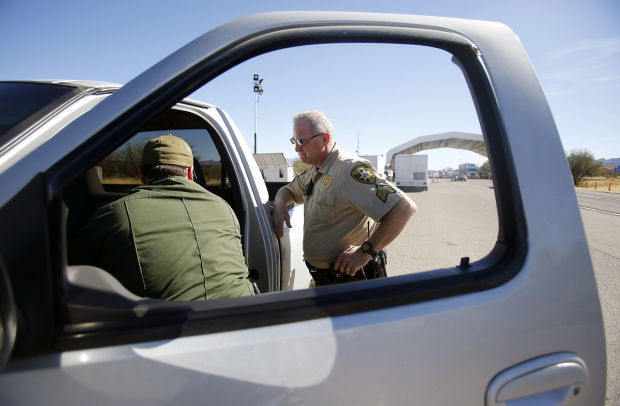A months-long dispute over the county’s acceptance of a federal border security grant could finally be settled Tuesday, when the Pima County Board of Supervisors is expected to consider terminating the $1.4 million contract.
In February, the board voted to accept the Operation Stonegarden grant, with the stipulation that five conditions be met, including covering all employee-related expenses, the establishment of a grant-coordinating process, tracking the financial impacts on other elements of the criminal justice system, developing a formal policy for law enforcement officers and the creation of a community committee to look at racial profiling. All five conditions have since been met.
The grant covers overtime, mileage and equipment cost for the sheriff’s department and is an effort to encourage collaboration between local and federal law enforcement agencies.
In the spring, when family separations at the border elicited public outcry, the supervisors decided to revisit the county’s acceptance of the grant, citing concerns that the federal government was using law enforcement for political means.
After several delayed votes, the issue is back on the agenda for Tuesday and the only option— other than allowing the contract to stand — is to terminate the grant, County Administrator Chuck Huckelberry said in an Aug. 27 memo.
The original terms of the contract say that either party can terminate the agreement with 30 days’ notice, meaning that the earliest termination date for the contract would be Oct. 5 — less than three months before its Dec. 31 expiration date.
Pima County Sheriff Mark Napier has said in a letter to the supervisors that rejection of Stonegarden will do nothing to change immigration policy at the federal level.
“There is a misconception that involvement in Stonegarden entwines my department in immigration enforcement,” Napier said in the letter.
“My deputies have no authority to engage in proactive immigration enforcement.”
Despite the grant’s murky future, Napier told the Arizona Daily Star his agency has already spent more than $500,000 of the grant money.
Napier has been vocal over the past few months about the negative implications of rejecting the grant, including Pima County losing its voice at the national table when it comes to immigration issues.
Rejecting the funds would also be detrimental to public safety in Pima County, since Stonegarden funds are used to deploy deputies to underserved and remote areas, Napier said. Operations funded by the grant have also resulted in the seizure of drugs and guns, along with the discovery of human- or sex-trafficking incidents.
Last week, Napier compiled an eight-page summary that outlined dozens of “significant investigations, arrests and rescues” that have taken place over the last two years using Stonegarden funds.
“Aside from law enforcement functions, deputies have participated in rescue functions or provided aid to those who might otherwise fall victim to the harsh environment of Pima County deserts,” Napier said in the summary.
In addition to seizing hundreds of pounds of drugs and recovering hundreds of firearms and thousands of rounds of ammunition, deputies also provided food, water and assistance to several immigrants they encountered while on patrol.
In only one of the 11 “humanitarian efforts” synopses included in the summary does Napier indicate that an immigrant was turned over to federal authorities. It’s unclear from the other 10 synopses if federal authorities were called for assistance.
“Politics should play no part in public safety policy implementation,” Napier said in the letter. “We need to do the right thing and approve continued participation in Stonegarden even in the face of political adversity and ideological pressure.”





